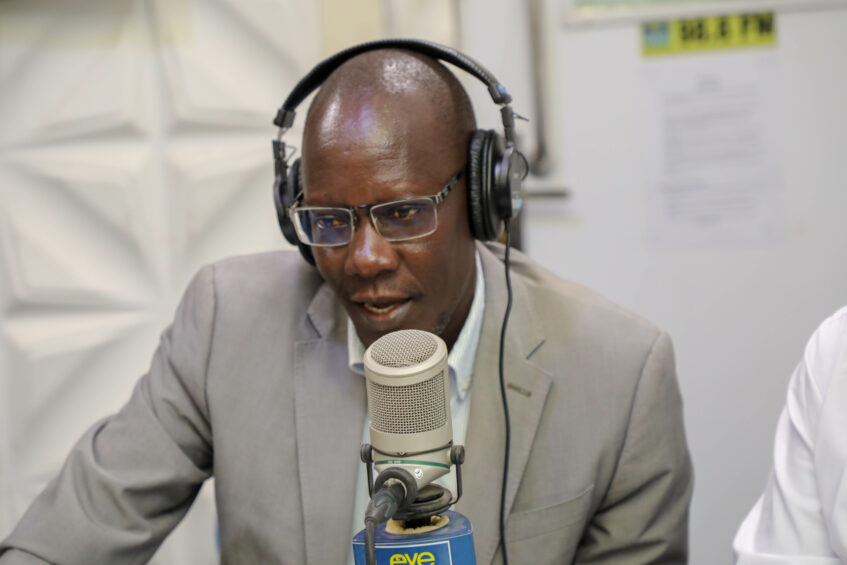
Dr. Alex Bolo, the PEPFAR’s treatment advisor - Credit: Eye Radio/Moses Awan - Jan. 27, 2023
As it marks its 20-year anniversary on January 28, 2022, the U.S. President’s Emergency Plan for AIDS Relief or PEPFAR has enabled nearly 48,000 South Sudanese living with HIV to access lifelong, life-saving antiretroviral treatment in South Sudan.
This is through its activities in the country over the past 15 years.
PEPFAR is a program that has helped save more than 25 million lives globally.
It has also played a critical role in building South Sudan’s health system over the past two decades, particularly the District Health Information, HIV Surveillance, and National Laboratory systems.
The PEPFAR program in South Sudan offers an opportunity to accelerate progress toward meeting the Revitalized Transitional Government of National Unity’s HIV eradication goals in a complex environment challenged by prolonged conflict, floods, and food insecurity.
PEPFAR’s successes in South Sudan can be attributed to innovative implementation of HIV prevention, care, and treatment services in the highest-prevalence areas of South Sudan.
This include Western Equatoria, Central Equatoria, Western Bahr al Ghazal, and Lakes States.
With PEPFAR’s 20th anniversary globally, its work in South Sudan is a prime example of how the United States is committed to helping countries with the most acute needs to reach HIV epidemic control.
Michael J. Adler is the US Ambassador to South Sudan.
“This year we are focused on what PEPFAR can do in service to the many people who remain affected by HVI/AIDS, including those in South Sudan,” said Adler.
The ambassador added the project is implemented by the Centers for Disease Control through USAID and the Department of Defense.
Adler reiterated his government’s commitment to exert more effort to help end HIV/AIDs in the world, including South Sudan.
“We remain as committed as ever to working with all of those who share our goal to end HIV/AIDS as a public health threat by 2030,” Adler added.
The diplomat stressed the need for the government of South Sudan to provide adequate finances to maintain HIV/AIDS services in the country.
“The end of HIV/AIDs is a public health threat by 2030 is an ambitious but an achievable goal, it will require effective and sustained government commitments to both increasing access to service and to providing adequate financing to maintain those services,” He added.
For her part, the undersecretary at the national ministry of health, Dr. Victoria Achut commended PEPFAR for its role in supporting South Sudan’s health sector.
“One of the contributions of PEPFAR in South Sudan is the improvement in human resource development and capacity building, PEPFAR has recruited a number of staff at both national and subnational levels including supporting and training more than 1,000 people who are community mobilizers supporting HIV sector,” Achut stressed.
“One major achievement also is the upgrading and restructuring for us to have robust data health care system, we have upgraded from DHIS 1[Data Health Information System] to DHIS 2,” she said.
“We are now moving like other countries in the region. We have data flow from the facilities to the county health department, to the state, and to the national level.”
Dr. Alex Bolo is the PEPFAR’s treatment advisor.
He outlined the strategy of the project. “The strategy has five pillars, the first pillar is ensuring health equity for priority populations, the second pillar focuses on working to ensure the sustainability of the HIV response in the country, the third pillar is focusing on public health systems and health security, the fourth pillar is dedicated to building transformative partnership, and the fifth pillar is dedicated to science.” Dr. Alex explained.
The US government vowed to continue partnering closely with those in South Sudan who seek to save lives from HIV, investing in sustainable health systems that promote health equity and contribute to the global health security agenda.
PEPFAR activities focus on expanding access to HIV prevention, treatment, and care interventions.
These include the provision of antiretroviral treatment, pre-exposure prophylaxis, voluntary male circumcision, condoms, and other commodities related to HIV services.
The Office of the U.S. Global AIDS Coordinator and Global Health Diplomacy leads, manages, and oversees the U.S. President’s Emergency Plan for AIDS Relief (PEPFAR).
Through PEPFAR, the U.S. government has invested over $100 billion in the global HIV/AIDS response, the largest commitment by any nation to address a single disease in history, saving 25 million lives, preventing millions of HIV infections, and accelerating progress toward controlling the global HIV/AIDS pandemic in more than 50 countries.
Support Eye Radio, the first independent radio broadcaster of news, information & entertainment in South Sudan.
Make a monthly or a one off contribution.
Copyright 2024. All rights reserved. Eye Radio is a product of Eye Media Limited.